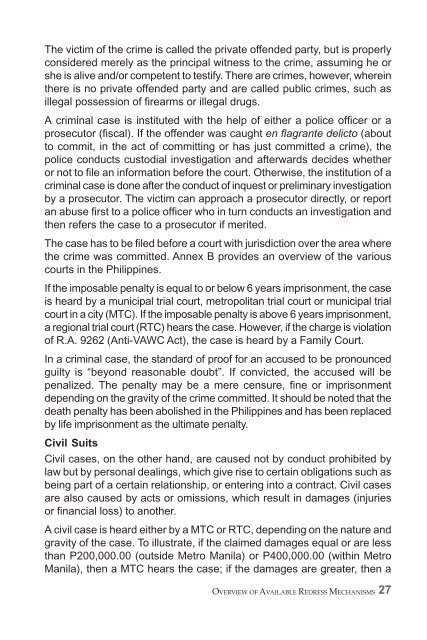Download this publication - AIDS Data Hub
Download this publication - AIDS Data Hub
Download this publication - AIDS Data Hub
- No tags were found...
You also want an ePaper? Increase the reach of your titles
YUMPU automatically turns print PDFs into web optimized ePapers that Google loves.
The victim of the crime is called the private offended party, but is properlyconsidered merely as the principal witness to the crime, assuming he orshe is alive and/or competent to testify. There are crimes, however, whereinthere is no private offended party and are called public crimes, such asillegal possession of firearms or illegal drugs.A criminal case is instituted with the help of either a police officer or aprosecutor (fiscal). If the offender was caught en flagrante delicto (aboutto commit, in the act of committing or has just committed a crime), thepolice conducts custodial investigation and afterwards decides whetheror not to file an information before the court. Otherwise, the institution of acriminal case is done after the conduct of inquest or preliminary investigationby a prosecutor. The victim can approach a prosecutor directly, or reportan abuse first to a police officer who in turn conducts an investigation andthen refers the case to a prosecutor if merited.The case has to be filed before a court with jurisdiction over the area wherethe crime was committed. Annex B provides an overview of the variouscourts in the Philippines.If the imposable penalty is equal to or below 6 years imprisonment, the caseis heard by a municipal trial court, metropolitan trial court or municipal trialcourt in a city (MTC). If the imposable penalty is above 6 years imprisonment,a regional trial court (RTC) hears the case. However, if the charge is violationof R.A. 9262 (Anti-VAWC Act), the case is heard by a Family Court.In a criminal case, the standard of proof for an accused to be pronouncedguilty is “beyond reasonable doubt”. If convicted, the accused will bepenalized. The penalty may be a mere censure, fine or imprisonmentdepending on the gravity of the crime committed. It should be noted that thedeath penalty has been abolished in the Philippines and has been replacedby life imprisonment as the ultimate penalty.Civil SuitsCivil cases, on the other hand, are caused not by conduct prohibited bylaw but by personal dealings, which give rise to certain obligations such asbeing part of a certain relationship, or entering into a contract. Civil casesare also caused by acts or omissions, which result in damages (injuriesor financial loss) to another.A civil case is heard either by a MTC or RTC, depending on the nature andgravity of the case. To illustrate, if the claimed damages equal or are lessthan P200,000.00 (outside Metro Manila) or P400,000.00 (within MetroManila), then a MTC hears the case; if the damages are greater, then aOVERVIEW OF AVAILABLE REDRESS INTRODUCTION MECHANISMS 27















